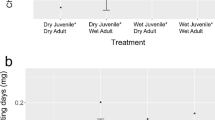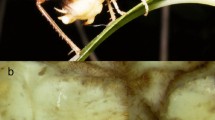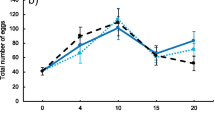Abstract
Traits under strong directional selection are predicted to be condition dependent and thus increase in development when an organism acquires more resources. This prediction has been tested for a variety of traits, particularly those under precopulatory sexual selection. However, few studies compare the condition dependence of a variety of phenotypic traits, potentially subject to different selective forces. Here we examine the condition dependence of several important life history traits, including those under both pre- and postcopulatory sexual selection, in the mealworm beetle, Tenebrio molitor. We manipulated condition by randomly assigning larvae to one of high-, medium- or low-quality diets. For males reared on the three diets, we measured the following: (a) adult body size and lifespan, (b) pheromone attractiveness, (c) weight of their ejaculate transferred to females and (d) fecundity of their female mates. Males raised on a high-quality diet were larger and lived longer than males raised on medium- and low-quality diets. Although females were significantly attracted to male pheromones, there were no significant differences amongst condition treatments in male attractiveness nor ejaculate transfer. Furthermore, mates’ fecundity was also not affected by male condition. We discuss these results considering previous work on trade-offs and condition dependence of life history traits.
Significance statement
Theory suggests that traits that are under strong selection should be sensitive to the amount of resources an organism has available (i.e. dependent on condition), such that when those resources are plentiful, then these traits should increase disproportionately to other traits that are not so important to relative fitness. Much research has been done on the condition dependence of precopulatory traits under strong sexual selection, but not as much on postcopulatory traits. Our research focused on measuring the effect of resources on both pre- and postcopulatory traits in male mealworm beetles as well as their effect on their mates’ relative fitness. Interestingly, although we found that important life history traits such as body size and adult lifespan were condition dependent, precopulatory traits such as pheromone attractiveness and postcopulatory traits such as ejaculate transfer were not. Our study highlights the complicated nature of tradeoffs in resource allocation faced by individuals under sexual selection.

Similar content being viewed by others
References
Andersson M (1994) Sexual selection. Princeton University Press, Princeton, NJ
Arnqvist G, Rowe L (2005) Sexual conflict. Princeton University Press, Princeton, NJ. https://doi.org/10.1515/9781400850600
Bhattachraya AK, Ameel JJ, Waldbauer GP (1970) Method for sexing living pupal and adult yellow mealworms. Sci Notes 63:1783
Birkhead TR, Møller AP (1998) Sperm competition and sexual selection. Academic Press, San Diego, CA
Bonduriansky R, Wheeler J, Rowe L (2005) Ejaculate feeding and female fitness in the sexually dimorphic fly Prochyliza xanthostoma (Diptera: Piophilidae). Anim Behav 69:489–497
Carazo P, Sanchez E, Font E, Desfilis E (2004) Chemosensory cues allow male Tenebrio molitor beetles to assess the reproductive status of potential mates. Anim Behav 68(1):123–129. https://doi.org/10.1016/j.anbehav.2003.10.014
Chapman T, Liddle LF, Kalb JM, Wolfner MF, Partridge L (1995) Cost of mating in Drosophila melanogaster females is mediated by male accessory-gland products. Nature 373(6511):241–244. https://doi.org/10.1038/373241a0
Cotton S, Fowler K, Pomiankowski A (2004) Do sexual ornaments demonstrate heightened condition-dependent expression as predicted by the handicap hypothesis? Proc Roy Soc Lond B Biol Sci 271:771–783
Darwin C (1871) The descent of man and selection in relation to sex. John Murray, London
Drnevich JM (2003) Number of mating males and mating interval affect last-male sperm precedence in Tenebrio molitor L. Anim Behav 66:349–357
Drnevich JM, Hayes EF, Rutowski RL (2001a) Sperm precedence, mating interval, and a novel mechanism of paternity bias in a beetle (Tenebrio molitor L.) Behav Ecol Sociobiol 48:447–451
Drnevich JM, Papke RM, Rauser CL, Rutowski RL (2001b) Material benefits from mating multiply in female mealworm beetles (Tenebrio molitor L.) J Insect Behav 14(2):215–230. https://doi.org/10.1023/A:1007889712054
Droge-Young EM, Belote JM, Eeswara A, Pitnick S (2016) Extreme ecology and mating system: discriminating among direct benefits models in red flour beetles. Behav Ecol 27(2):575–583. https://doi.org/10.1093/beheco/arv191
Dunkel FV (1992) The stored grain ecosystem: a global perspective. J Stored Prod Res 28(2):73–87. https://doi.org/10.1016/0022-474X(92)90017-K
Eberhard WG, Cordero C (1995) Sexual selection by cryptic female choice on male seminal products: a new bridge between sexual selection and reproductive physiology. Trends Ecol Evol 10:493–495
Gadzama NM, Happ CM (1974) Fine structure and evacuation of the spermatophore of Tenebrio molitor L, (Coleoptera: Tenebrionidae). Tissue Cell 6(1):95–108. https://doi.org/10.1016/0040-8166(74)90025-1
Gage MJG, Baker RR (1991) Ejaculate size varies with sociosexual situation in an insect. Ecol Entomol 16(3):331–337. https://doi.org/10.1111/j.1365-2311.1991.tb00224.x
Grafen A (1990) Sexual selection unhandicapped by the Fisher process. J Theor Biol 144(4):473–516. https://doi.org/10.1016/S0022-5193(05)80087-6
Gwynne DT (2008) Sexual conflict over nuptial gifts in insects. Annu Rev Entomol 53(1):83–101. https://doi.org/10.1146/annurev.ento.53.103106.093423
Hack MA (1997) Assessment strategies in the contests of male crickets, Acheta domesticus (L.) Anim Behav 53(4):733–747. https://doi.org/10.1006/anbe.1996.0310
Happ GM (1969) Multiple sex pheromones of the mealworm beetle, Tenebrio molitor. Nature 222(5189):180–181. https://doi.org/10.1038/222180a0
Holm S (1979) A simple sequentially rejective multiple test procedure. Scand J Stat 6:65–70
Holzer B, Jacot A, Brinkhof MWG (2003) Condition-dependent signaling affects male sexual attractiveness in field crickets, Gryllus campestris. Behav Ecol 14:353–359
Hooper AK, Spagopoulou F, Wylde Z, Maklakov AA, Bonduriansky R (2016) Ontogenetic timing as a condition-dependent life history trait: high-condition males develop quickly, peak early, and age fast. Evolution 71:671–685
House CM, Jensen K, Rapkin J, Lane S, Okada K, Hosken DJ, Hunt J (2016) Macronutrient balance mediates the growth of sexually selected weapons but not genitalia in male broad-horned beetles. Funct Ecol 30(5):769–779. https://doi.org/10.1111/1365-2435.12567
Hunt J, Brooks R, Jennions MD, Smith MJ, Bentsen CL, Bussière LF (2004) High-quality male field crickets invest heavily in sexual display but die young. Nature 432(7020):1024–1027. https://doi.org/10.1038/nature03084
Ivy TM, Johnson JC, Sakaluk SK (1999) Hydration benefits to courtship feeding in crickets. Proc Roy Soc Lond B Biol Sci 266(1428):1523–1527. https://doi.org/10.1098/rspb.1999.0810
Jennions MD, Møller AP, Petrie M (2001) Sexually selected traits and adult survival: a meta-analysis. Q Rev Biol 76(1):3–36. https://doi.org/10.1086/393743
Judge KA, Ting JJ, Gwynne DT (2008) Condition dependence of male life span and calling effort in a field cricket. Evolution 62(4):868–878. https://doi.org/10.1111/j.1558-5646.2008.00318.x
Kahri AF, Cox RM (2015) Diet affects ejaculate traits in a lizard with condition-dependent fertilization success. Behav Ecol 26:1502-1511. https://doi.org/10.1093/beheco/arv105
Kaldun B, Otti O (2016) Condition-dependent ejaculate production affects male mating behavior in the common bedbug Cimex lectularius. Ecol Evol 6(8):2548–2558. https://doi.org/10.1002/ece3.2073
Kotiaho JS (2000) Testing the assumptions of conditional handicap theory: costs and condition dependence of a sexually selected trait. Behav Ecol Sociobiol 48(3):188–194. https://doi.org/10.1007/s002650000221
Murphy CG (1994) Determinants of chorus tenure in barking treefrogs (Hyla gratiosa). Behav Ecol Sociobiol 34(4):285–294. https://doi.org/10.1007/BF00183479
van Noordwijk AJ, de Jong G (1986) Acquisition and allocation of resources: their influence on variation in life history tactics. Am Nat 128(1):137–142. https://doi.org/10.1086/284547
Otte D, Cade WH (1976) On the role of olfaction in sexual and interspecies recognition in crickets (Acheta and Gryllus). Anim Behav 24(1):1–6. https://doi.org/10.1016/S0003-3472(76)80091-7
Parker GA (1970) Sperm competition and its evolutionary consequences in the insects. Biol Rev 45(4):525–567. https://doi.org/10.1111/j.1469-185X.1970.tb01176.x
Perry JC, Rowe L (2010) Condition-dependent ejaculate size and composition in a ladybird beetle. Proc R Soc Lond B 277(1700):3639–3647. https://doi.org/10.1098/rspb.2010.0810
Pike TW, Blount JD, Bjerkeng B, Lindstrom J, Metcalfe NB (2007) Carotenoids, oxidative stress and female mating preference for longer lived males. Proc Roy Soc Lond B 274(1618):1591–1596. https://doi.org/10.1098/rspb.2007.0317
Pitcher TE, Evans JP (2001) Male phenotype and sperm number in the guppy (Poecilia reticulata). Can J Zool 79(10):1891–1896. https://doi.org/10.1139/z01-142
Punzalan D, Cooray M, Rodd FH, Rowe L (2008) Condition dependence of sexually dimorphic colouration and longevity in the ambush bug Phymata americana. J Evol Biol 21(5):1297–1306. https://doi.org/10.1111/j.1420-9101.2008.01571.x
Rantala MJ, Jokinen I, Kortet R, Vainikka A, Suhonen J (2002) Do pheromones reveal male immunocompetence? Proc Roy Soc Lond B Biol Sci 269:1681–1685
Rantala MJ, Kortet R, Kotiaho JS, Vainikka A, Suhonen J (2003) Condition dependence of pheromones and immune function in the grain beetle Tenebrio molitor. Funct Ecol 17:534–540
Rowe L, Houle D (1996) The lek paradox and the capture of genetic variance by condition dependent traits. Proc Roy Soc Lond B Biol Sci 263(1375):1415–1421. https://doi.org/10.1098/rspb.1996.0207
Rutowski RL (1982) Communication in mealworm beetles. In: Matthews JR, Matthews RW (eds) Insect behaviour. Westview Press, Boulder, CO, pp 101–104
Scheuber H, Jacot A, Brinkhof MWG (2003a) The effect of past condition on a multicomponent sexual signal. Proc Roy Soc Lond B Biol Sci 270:1779–1784
Scheuber H, Jacot A, Brinkhof MWG (2003b) Condition dependence of a multicomponent sexual signal in the field cricket Gryllus campestris. Anim Behav 65:721–727
Scheuber H, Jacot A, Brinkhof MWG (2004) Female preference for multiple condition-dependent components of a sexually selected signal. Proc Roy Soc Lond B Biol Sci 271:2453–2457
Simmons LW (2001) Sperm competition and its evolutionary consequences in the insects. Princeton University Press, Princeton
Siva-Jothy MT, Earle BD, Thompson J, Ryder JJ (1996) Short- and long-term sperm precedence in the beetle Tenebrio molitor: a test of the ‘adaptive sperm removal’ hypothesis. Physiol Entomol 21(4):313–316. https://doi.org/10.1111/j.1365-3032.1996.tb00871.x
Tachon G, Murray A-M, Gray DA, Cade WH (1999) Agonistic displays and the benefits of fighting in the field cricket, Gryllus bimaculatus. J Insect Behav 12(4):533–543. https://doi.org/10.1023/A:1020970908541
Tschinkel W, Willson C, Bern HA (1967) Sex pheromone of the mealworm beetle (Tenebrio molitor). J Exp Zool 164:81–85
Ursprung C, den Hollander M, Gwynne DT (2009) Female seed beetles, Callosobruchus maculatus, remate for male-supplied water rather than ejaculate nutrition. Behav Ecol Sociobiol 63:781–788
Vahed K (2007) All that glisters is not gold: sensory bias, sexual conflict and nuptial feeding in insects and spiders. Ethology 113(2):105–127. https://doi.org/10.1111/j.1439-0310.2006.01312.x
Vainikka A, Seppala O, Loytynoja K, Rantala MJ (2006) Fitness consequences of female preference for male pheromone in Tenebrio molitor. Evol Ecol Res 8:943–957
Valentine JM (1931) The olfactory sense of the adult mealworm beetle Tenebrio molitor (Linn.) J Exp Zool 58(1):165–227. https://doi.org/10.1002/jez.1400580109
Wagner WE, Harper CJ (2003) Female life span and fertility are increased by the ejaculates of preferred males. Evolution 57(9):2054–2066. https://doi.org/10.1111/j.0014-3820.2003.tb00385.x
Wagner WE Jr (2011) Direct benefits and the evolution of female mating preferences: conceptual problems, potential solutions, and a field cricket. Adv Stud Behav 43:274–319
Wagner WE Jr, Kelley RJ, Tucker KR, Harper CJ (2001) Females receive a life-span benefit from male ejaculates in a field cricket. Evolution 55(5):994–1001.
Wedell N, Gage MJG, Parker GA (2002) Sperm competition, male prudence and sperm-limited females. Trends Ecol Evol 17:313–320
Worden BD, Parker PG (2001) Polyandry in grain beetles, Tenebrio molitor, leads to greater reproductive success: material or genetic benefits? Behav Ecol 12(6):761–767. https://doi.org/10.1093/beheco/12.6.761
Worden BD, Parker PG, Pappas PW (2000) Parasites reduce attractiveness and reproductive success in male grain beetles. Anim Behav 59(3):543–550. https://doi.org/10.1006/anbe.1999.1368
Zahavi A (1975) Mate selection—selection for a handicap. J Theor Biol 53(1):205–214. https://doi.org/10.1016/0022-5193(75)90111-3
Zuk M (1987) Variability in attractiveness of male field crickets (Orthoptera: Gryllidae) to females. Anim Behav 35(4):1240–1248. https://doi.org/10.1016/S0003-3472(87)80182-3
Acknowledgements
We would like to thank Darryl Gwynne, Mark Fitzpatrick, Andrew McDonald, Edyta Piascik, Laura Robson, Jill Wheeler, Bill Wagner, Mike Stock, Dave Hosken and three anonymous reviewers for helpful comments on previous versions of this manuscript. Stephanie Smith helped with data collection.
Funding
This research was funded by a Discovery Grant from the Natural Sciences and Engineering Research Council (NSERC) to Darryl Gwynne and an NSERC PGS B to KAJ.
Author information
Authors and Affiliations
Corresponding author
Additional information
Communicated by D. J. Hosken
Rights and permissions
About this article
Cite this article
McConnell, M.W., Judge, K.A. Body size and lifespan are condition dependent in the mealworm beetle, Tenebrio molitor, but not sexually selected traits. Behav Ecol Sociobiol 72, 32 (2018). https://doi.org/10.1007/s00265-018-2444-3
Received:
Revised:
Accepted:
Published:
DOI: https://doi.org/10.1007/s00265-018-2444-3




